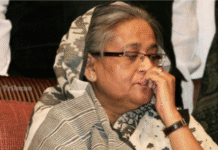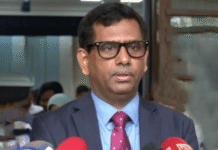
Finance Minister AMA Muhith on Wednesday emphasised minimising the knowledge gap of farmers about climate change adaptation to boost food production and ensure food security in the country.
“There’s a knowledge gap among farmers over climate change adaptation. FAO can help remove the knowledge gap… we emphasize the passing knowledge to catch up the adaptation process,” he said.
The Finance Minister was addressing a validation workshop for the New FAO country programming framework (CPF) 2013-2018 jointly organised by Economic relation Division (ERD) and Food and Agriculture Organisation (FAO) at National Economic Council’s conference room.
Speaking as then chief guest, the minister said, “We have the scope to increase rice production and increase substitute crops.”
Bangladesh has had outstanding performance in the food and agriculture sectors as the country has been able to raise food production by three times over the last 30 years, he said adding that the government gives incentives in all sectors related to food security.
Food Secretary Mushfeka Ikfat, Agriculture Secretary SM Nazmul Islam, Executive Director of Bangladesh Centre for Advanced Studies A Atiq Rahman and representatives from the ministries concerned spoke at the function. ERD additional secretary Md Ashadul Islam made the welcome speech.
Atiq Rahman said Bangladeshi farmers have done excellent job in adaptation with the changes of the climate in the world. “In our country, 95 percent people are confident to adjust with the climate changes.
The country’s farmers have been obtaining indigenous knowledge over food production from their predecessors (old generation). They use the indigenous knowledge in crop harvest in the wake of the climate changes. But there is knowledge gap as the process of passing knowledge is very slow.”
Under the circumstance, international organisations like FAO should help minimise the knowledge gap, he suggested.
FAO representative in Bangladesh Mike Robson and ERD joint secretary Sultana Afroz made two separate presentations on CPF 2013-2018, a tool used by FAO and the government to define the priorities of FAO’s assistance to Bangladesh.
The new CPF has endorsed is fully aligned to Bangladesh development objectives as well as the overall strategic framework of FAO and has been developed over a number of months.
Mike Robson stated that the country programming framework will strengthen the long-standing partnership between the government of Bangladesh and FAO.
“In the coming five years, the government with FAO’s technical support will invest resources to reduce poverty and enhance food and nutrition security, to increase agricultural productivity, to improve food market systems and related technology, and to increase resilience of the communities to shocks,” he said.
The framework identifies priorities for FAO’s work with the government of Bangladesh and maps out the road for further development of the agriculture sector and reduction in the number of hungry people in the country. Through discussions and collaboration with key stakeholders, including civil society and farmer representatives, the FAO’s CPF 2013-2018 received support and endorsement by all sides.
Source: UNB Connect









